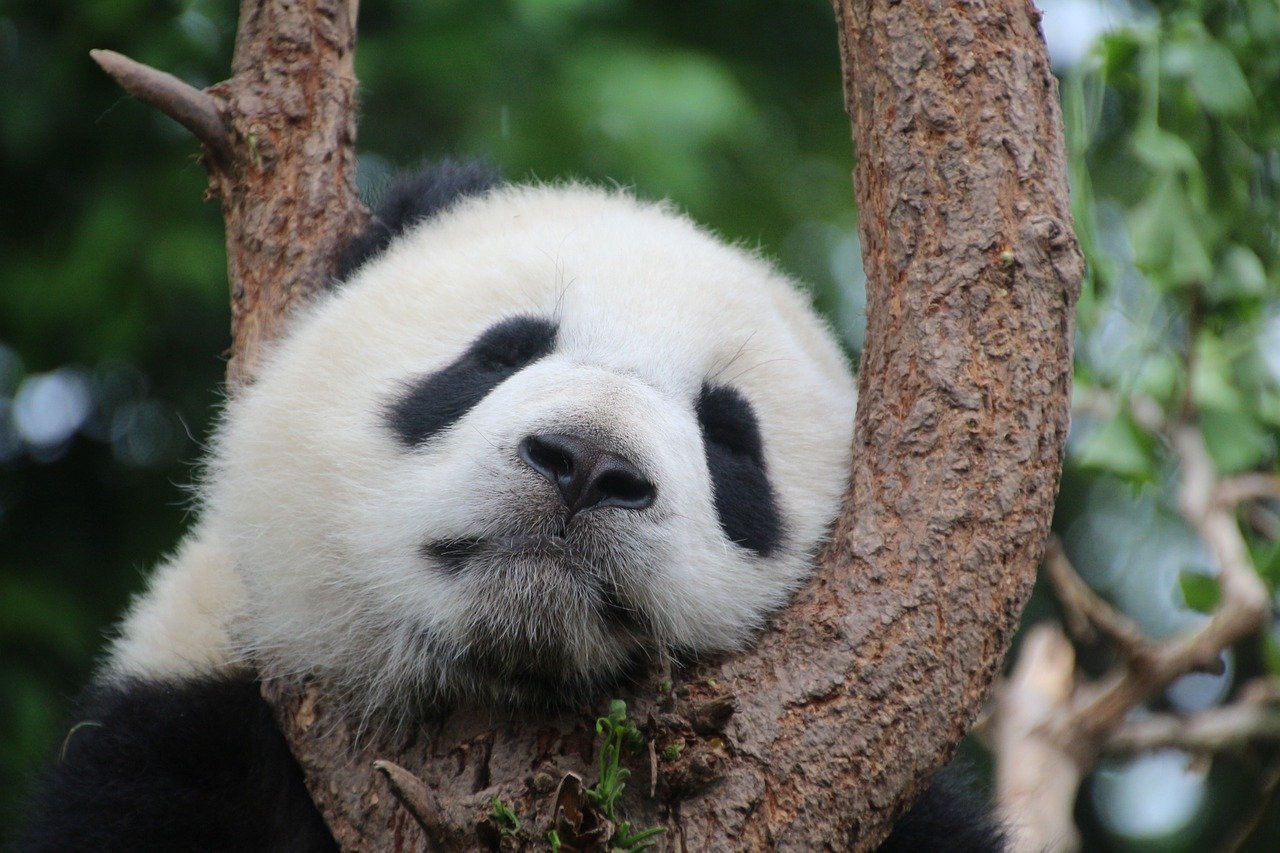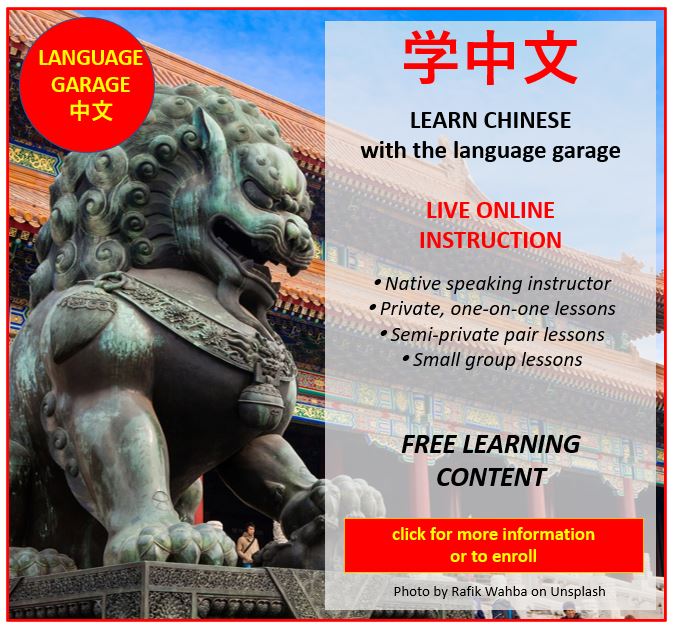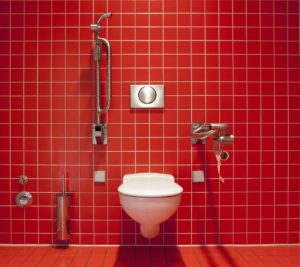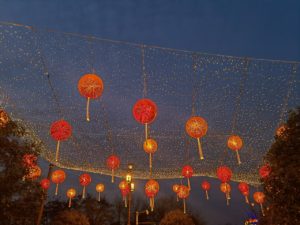动物 dòngwù: Talking about Animals in Chinese
In this post you’ll learn how to talk about animals in Chinese. First, we’ll learn vocabulary and expressions for talking about pets. Next we’ll learn how to talk about the sounds that animals make. After that we’ll learn how to talk about farm animals in Chinese. Next we’ll look at birds, wild animals, animals you’d see at a zoo or on safari in Africa, and animals that live in the water. Finally, we’ll wrap up with Chinese vocabulary for bugs.
你养宠物吗?nǐ yǎng chǒngwù ma ?Do you have any pets?
People keep all sorts of animals as pets, but the most common ones are 狗 gǒu a dog, 猫 māo a cat, 金鱼 jīn yú a goldfish, 鹦鹉 yīng wǔ a parakeet, 鸽子gē zi a parrot, 仓鼠 cāng shǔ a hamster. A 老鼠 lǎo shǔ (mouse, rat), isn’t usually a pet, but that you can often find one in or around buildings.
- 我们有一只狗和猫。
Wǒmen yǒu yīzhī gǒu hé māo.
We have a dog and a cat. - 你的狗/猫叫什么名字?
Nǐ de gǒu / māo jiào shén me míng zi?
What’s your dog’s/cat’s name?
- 我在和我们的小狗一起玩儿呢。
Wǒ zài hé wǒmen de xiǎogǒu yīqǐ wánr ne.
I’m playing with our puppy. - 我在抚摸我们的小猫。
Wǒ zài fǔmō wǒmen de xiǎomāo.
I’m petting our kitten. - 你的狗咬人吗?
Nǐ de gǒu yǎo rén ma?
Does your dog bite? - 你的猫抓人吗?
Nǐ de māo zhuā rén ma?
Does your cat scratch? - 我在鱼缸里养了一条金鱼。
Wǒ zài yúgāng lǐ yǎng le yī tiáo jīn yú.
I have a goldfish in a fishbowl. - 我在鱼缸里养了很多鱼。
Wǒ zài yúgāng lǐ yǎng le hěnduō yú.
I have a lot of fish in an aquarium. - 我们养了两只仓鼠在笼子里。
Wǒmen yǎngle liǎng zhī cāngshǔ zài lóngzi lǐ.
We have two hamsters in a cage. - 我的鹦鹉喜欢讲话。
Wǒde yīngwǔ xǐhuan jiǎng huà.
My parrot talks a lot. - 看到老鼠,我会尖叫起来。
Kàndào lǎoshǔ , wǒ huì jiānjiào qǐlái.
I screamed when I saw a mouse. - 这不是一只小耗子,是一只大老鼠。
Zhè búshì yīzhī xiǎo hàozi, shì yī zhī dà lǎoshǔ.
That’s not a mouse, it’s a rat! (lit, little mouse, big mouse)
狗叫的声音是什么? Gǒu jiào de shēngyīn shì shénme? What sound does a dog make?
In English, dogs say “woof” and cats say “meow,” but of course that’s all different in Chinese.
- 狗叫的声音是“汪汪汪”。
Gǒu jiào de shēng yīn shì “ wāng wāng wāng.”
Dogs bark. A dog says “Woof!” - 猫叫的声音是“喵喵喵”。
Māo jiào de shēng yīn shì “ miāo miāo miāo.”
Cats meow. A cat says “Meow!” - 鸟叫的声音是“啾啾啾”。
Niǎo jiào de shēng yīn shì “ jiū jiū jiū.”
Birds chirp. A bird says “Tweet!” - 牛叫的声音是“哞哞哞” 。
Niú jiào de shēng yīn shì “ mōu mōu mōu.”
Cows moo. A cow says “moo.” - 公鸡叫的声音是“喔喔喔” 。
Ggōng jī jiào de shēng yīn shì “ ō ō ō.”
Roosters crow. A rooster says “cock-a-doodle-do.” - 鸭子叫的声音是“嘎嘎嘎”。
Yāzi jiào de shēngyīn shì “ gā gā gā.”
Ducks quack. A duck says “quack.” - 猪叫的声音是“哼哼哼”。
Zhū jiào de shēng yīn shì “ hēng hēng hēng.”
Pigs squeal. A pig says “oink oink.” - 狗生气时会大叫。
Gǒu shēngqì shí huì dàjiào.
Dogs growl when they’re angry. - 猫高兴时会发出咕噜声。
Māo gāoxing shí huì fāchū gūlū shēng.
Cats purr when they’re happy.
在农场zài nóng chǎng On the Farm
The most usual animals on a farm are: 马 mǎ a horse, 奶牛 nǎi niú a cow, 公牛gōng niú a bull, 猪 zhū a pig, 羊 yáng a sheep, 小鸡 xiǎo jī a chicken, 鹅 é a goose, 山羊 shān yáng a goat, 驴 lǘ a donkey.
- 马在牧场上奔跑。
Mǎ zài mùchǎng shàng bēn pǎo.
The horse is running in the pasture. - 牛在谷仓里。
Niú zài gǔcāng lǐ.
The cows are in the barn. - 猪在泥里躺着。
Zhū zài ní lǐ tǎng zhe.
The pigs are lying in the mud. - 鸡在鸡笼里。
Jī zài jī lóng lǐ.
The chickens are in the coop. - 农夫挤牛奶。
Nóng fū jǐ niú nǎi.
The farmer milks the cows. - 鸡下蛋。
Jī xià dàn.
Chickens lay eggs. - 羊毛来自绵羊。
Yáng máo lái zì mián yáng.
Wool comes from sheep.
Fur, Scales, and Feathers
Some other words related to animals that you want to know are: 毛 máo fur, 鳞片 lín piàn scales, 尾巴 wěi bā a tail, 蹄子 tí zi a hoof, 角 jiǎo a horn, 羽毛 yǔ máo a feather, 鬃毛 zōng máo a mane, 爪子 zhuǎ zi a claw.
- 这匹马的鬃毛真漂亮。
Zhè pǐ mǎ de zōngmáo zhēn piàoliang.
The horse has a beautiful mane. - 这只鹅有白色的羽毛。
Zhè zhī é yǒu báisè de yǔmáo.
The goose has white feathers. - 公牛有角。
Gōngniú yǒujiǎo.
Bulls have horns. - 这只猪有一条短短的尾巴。
Zhè zhī zhū yǒu yī tiáo duǎnduǎn de wěibā.
The pig has a little tail. - 什么动物有蹄子?
Shén me dòng wù yǒu tízi?
Which animals have hooves? - 小心!这只猫的爪子很锋利。
Xiǎo xīn! Zhè zhī māo de zhuǎzi hěn fēnglì.
Be careful! The cat has sharp claws.
鸟 niǎo Birds
Here’s some vocabulary for our feathered friends: 鸟 niǎo a bird, 鸭子 yā zi a duck, 老鹰 lǎo yīng an eagle, 鹰 yīng a hawk, 鸽子 gē zi a pigeon, 火鸡 huǒ jī a turkey, 孔雀 kǒng què a peacock, 天鹅 tiān’ é a swan, 猫头鹰 māo tóu yīng an owl, 海鸥 hǎi’ ōu a seagull.
- 你听到鸟叫了吗?
Nǐ tīngdào niǎo jiào le ma?
Do you hear the birds? - 湖边有一些鸭子。
Hú biān yǒu yī xiē yā zǐ.
There are some ducks next to the lake. - 老鹰飞得很高。
Lǎo yīng fēi dé hěn gāo.
Eagles fly very high. - 孔雀有很漂亮的羽毛。
Kǒng què yǒu hěn piàoliang de yǔmáo.
Peacocks have beautiful feathers. - 公园里有很多鸽子。
Gōngyuán lǐ yǒu hěn duō gēzi.
There are a lot of pigeons in the park. - 天鹅是非常优雅的动物。
Tiān’ é shì fēicháng yōuyǎ de dòngwù.
Swans are very elegant animals. - 一只猫头鹰在树林里叫。
Yīzhī māotóuyīng zài shùlín lǐ jiào.
An owl is hooting in the woods. - 海鸥在海滩上空飞翔。
Hǎi’ ōu zài hǎitān shàngkōng fēixiáng.
The seagulls are flying over the beach.
野外动物 yě wài dòng wù Wild Animals
The most common wild animals around the world are these: 鹿 lù a deer, 熊 xióng a bear, 狼 láng a wolf, 狐狸 hú li a fox, 草原狼 cǎo yuán láng a coyote, 浣熊 huàn xióng a raccoon, 松鼠 sōng shǔ a squirrel, 兔子 tù zi a rabbit, 蝙蝠 biān fú a bat, 蛇 shé a snake, 蜥蜴 xī yì a lizard. In China, if you’re very lucky you may even see a 大熊猫 dà xióngmāo (giant panda) or a 小熊猫 xiǎo xióngmāo (red panda).
- 那只鹿正在草地里吃草。
Nà zhī lù zhèng zài cǎo dì lǐ chī cǎo.
The deer are eating grass in the field. - 一只狐狸跑进了树林。
Yī zhī húli pǎo jìn le shù lín.
A fox ran into the woods. - 我们徒步走时看到了一只熊。
Wǒmen túbù zǒu shí kàndào le yī zhī xióng.
We saw a bear when we were hiking. - 狼在夜里嚎叫。
Láng zài yèlǐ háojiào.
Wolves howl at night. - 松鼠爬树很快。
Sōngshǔ páshù hěn kuài.
Squirrels climb trees very quickly. - 这里有浣熊吗?
Zhèlǐ yǒu huànxióng ma?
Are there raccoons here? - 蝙蝠在日落后出来。
Biānfú zài rìluò hòu chūlái.
Bats come out after sunset. - 小心!路上有条蛇。
Xiǎoxīn! Lùshàng yǒu tiáo shé.
Be careful! There’s a snake on the path. - 大熊猫吃竹子。
Dà xióngmāo chī zhúzi.
Giant pandas eat bamboo.
在动物园里 zài dòngwù yuán lǐ At the Zoo
Depending on where you live, you may not need to go to a zoo to see these animals. But for most of us, a zoo is the only place where we’ll see these: 大象 dàxiàng an elephant, 狮子 shīzi a lion, 老虎 lǎo hǔ a tiger, 长颈鹿 cháng jǐng lù a giraffe, 斑马 bān mǎ a zebra, 犀牛 xī niú a rhinoceros, 猴子 hóu zi a monkey, 大猩猩 dà xīng xing a gorilla, 河马 hé mǎ a hippopotamus.
- 大象有庞大的身体和长长的牙齿。
Dàxiàng yǒu pángdà de shēntǐ hé chángcháng de yáchǐ.
Elephants have trunks and long tusks. - 狮子常常咆哮。
Shīzi chángcháng páoxiào.
Lions roar and snarl. - 老虎的身上有条纹。
Lǎohu de shēnshàng yǒu tiáowén.
Tigers have stripes. - 长颈鹿的脖子很长。
Chángjǐnglù de bózi hěn cháng.
Giraffes have very long necks. - 斑马有黑白条纹。
Bānmǎ yǒu hēi bái tiáowén.
Zebras have black and white stripes. - 犀牛有很大的角。
Xīniú yǒu hěn dà de jiǎo.
Rhinos have very big horns. - 猴子常常花很多时间在树上。
Hóuzi chángcháng huā hěnduō shíjiān zài shùshàng.
Monkeys spend a lot of time in trees. - 大猩猩与人类非常相似。
Dàxīngxing yǔ rénlèi fēicháng xiāngsì.
Gorillas are very similar to people. - 河马跑得很快!
Hémǎ pǎo dé hěnkuài!
Hippos run very fast!
在水里 zài shuǐ lǐ In the Water
If you live near a lake or river, you may see some of these: 鱼 yú a fish, 青蛙 qīng wā a frog, 乌龟 wū guī a turtle, 海狸 hǎi lí a beaver, 蜗牛wōniú a snail, 短吻鳄 duǎn wěn’ è an alligator, 鳄鱼 è yú a crocodile.
- 这湖里有什么鱼?
Zhè hú lǐ yǒu shénme yú?
What kind of fish live in this lake? - 那块岩石上有一只乌龟。
Nà kuài yánshí shàng yǒu yīzhī wūguī.
There’s a turtle on that rock. - 我们在夏天的晚上能听到青蛙的叫声。
Wǒmen zài xiàtiān de wǎnshang néng tīngdào qīngwā de jiàoshēng.
We hear frogs at night in the summer. - 蜗牛爬得非常非常慢。
Wōniú pá dé fēicháng fēicháng màn.
Snails move very, very slowly. - 海狸啃树筑坝。
Hǎilí kěn shù zhù bà.
Beavers chew trees and make dams. - 那是短吻鳄还是鳄鱼?
Nà shì duǎn wěn’ è huái shì è yú?
Is that an alligator or a crocodile?
Talking about Ocean Animals in Chinese
In the ocean, you may see: 鲨鱼 shā yú a shark, 鲸鱼 jīng yú a whale, 海豚 hǎi tún a dolphin, 螃蟹 páng xiè a crab, 龙虾 lóng xiā a lobster, 水母 shuǐ mǔ a jellyfish, 海星 hǎi xīng a starfish, 海胆 hǎi dǎn a sea urchin, 鳗鱼 mán yú an eel, 蛤蜊gé li a clam, 贻贝yí bèi a mussel, 虾 xiā a shrimp, 章鱼 zhāng yú an octopus, 鱿鱼yóu yú a squid.
- 我害怕鲨鱼,所以我不在海里游泳!
Wǒ hàipà shāyú, suǒyǐ wǒ bùzài hǎi lǐ yóuyǒng!
I’m afraid of sharks, so I don’t swim in the ocean! - 我们在近海滩的海里看见海豚游来游去。
Wǒmen zài jìn hǎitān de hǎilǐ kànjiàn hǎitún yóu lái yóu qù.
We saw dolphins swimming near the beach. - 我们今天不游泳了。水母太多了。
Wǒmen jīntiān bù yóuyǒng le. shuǐmǔ tài duō le.
We’re not swimming today. There are too many jellyfish. - 我们在海滩上发现了一只海星。
Wǒmen zài hǎitān shàng fāxiàn le yī zhī hǎixīng.
We found a starfish on the beach. - 哎哟!我踩到了一只海胆。太疼了!
Āi yo! Wǒ cǎi dào le yīzhī hǎidǎn. tài téng le!
Ouch! I stepped on a sea urchin. That’s painful! - 那些岩石附近有很多螃蟹。
Nà xiē yánshí fùjìn yǒu hěnduō pángxiè.
There are a lot of crabs near those rocks. - 蛤蜊生活在沙子里。
Géli shēnghuó zài shāzi lǐ.
Clams live in the sand. - 贻贝生活在岩石上。
Yíbèi shēnghuó zài yánshí shàng.
Mussels live on rocks.
昆虫和其他小生物 kūnchóng hé qítā xiǎo shēng wù Insects and Other Small Creatures
If you every need to talk about insects, bugs, or other creep-crawlies, you will need to know these: 虫子 chóng zi a bug, 蜘蛛 zhī zhū a spider, 密封 mì fēng a bee, 甲虫 jiǎ chóng a beetle, 瓢虫 piáo chóng a ladybug, 苍蝇 cāng ying a fly, 蚊子 wén zi a mosquito, 蝴蝶 hú dié a butterfly, 蛾子 é zi a moth, 蚯蚓 qiū yǐn a worm, 蝎子 xiē zi a scorpion, 蚂蚁 mǎ yǐ an ant.
- 我不喜欢虫子!
Wǒ bù xǐhuan chóngzi!
I don’t like bugs! - 我卧室的墙上爬着一只大蜘蛛!
Wǒ wòshì de qiáng shàng pá zhe yīzhī dà zhīzhū!
There’s a big spider crawling on the wall in my bedroom! - 我今晚要被蚊子咬了。
Wǒ jīnwǎn yào bèi wénzi yǎo le 。
The mosquitos are biting me tonight. - 我被一只蜜蜂蛰了!
Wǒ bèi yī zhī mì fēng zhē le!
I was stung by a bee! - 蝴蝶美丽多彩。
Húdié měilì duōcǎi.
Butterflies are beautiful and colorful. - 飞蛾在夜间绕着灯飞来飞去。
Fēi’ é zài yèjiān rào zhe dēng fēi lái fēi qù.
Moths fly around lights at night. - 蚯蚓生活在土壤中。
Qiū yǐn shēnghuó zài tǔ rǎng zhōng.
Worms live in the soil. - 瓢虫是黑色和红色的。
Piáochóng shì hēisè hé hóngsè de 。
Ladybugs are black and red. - 小心!这里有蝎子。
Xiǎo xīn! zhè lǐ yǒu xiē zi.
Be careful! There are scorpions here.
Get on the road to speaking Chinese with the Language Garage!
We hope you’ve enjoyed learning how to talk about animals in Chinese. If you’d like to learn more:
- Create a free Language Garage account to access tons of Chinese vocabulary, grammar, and culture.
- Follow us on Facebook, LinkedIn, BlueSky, Twitter, Threads, Instagram, or Pinterest. We publish lots of Chinese vocabulary, grammar, and culture notes, so it’s a great way to pick up some new vocabulary and practice.
- Check out our other posts on Chinese language, culture, and more.
- Enroll in affordable, flexible, and personalized private online Chinese lessons or sign up for a small group online Chinese class.
Image Credit: Cimberley on Pixabay






